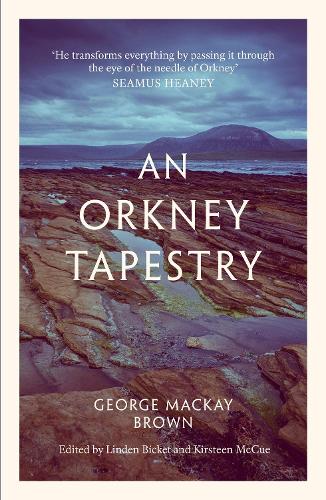
An Orkney Tapestry
(Paperback)
Publishing Details
An Orkney Tapestry
By (Author) Linden Bicket
Edited by Kirsteen McCue
By (author) George Mackay Brown
Birlinn General
Polygon An Imprint of Birlinn Limited
1st October 2021
3rd June 2021
United Kingdom
Classifications
General
Non Fiction
Folklore studies / Study of myth
941.132
Physical Properties
Paperback
304
Width 130mm, Height 195mm, Spine 20mm
271g
Description
A unique look at Orkney through a poet's eye, An Orkney Tapestry is a celebration of its people, language and place. It is not written as a continuous historical narrative but as a pattern of history, legend and folklore. Beautifully illustrated throughout by Sylvia Wishart a fellow Orcadian they show what has been won and lost in Orkney over the centuries.
Chapters discuss modern Orkney; Rackwick: the development and decline of an island community, a microcosm of Orkney life; Vikings: a study of three great Vikings: Earl Sigurd; Said Magnus and Martyr, and Earl Rognvald the Crusader; Poets: a ballad maker and Robert Rendall, an Orkney poet; Midwinter Music and Midsummer Music: two chapters on folklore and communal art and poetry.
Reviews
'Skilfully constructed, Mackay Brown weaves together myth, folklore, history, poetry, and even a self-contained play'
-- Juanita Coulson * The Lady *'He transforms everything by passing it through the eye of the needle of Orkney'
-- Seamus Heaney'[Brown] is a uniquely observant and skilful chronicler of life in his native Orkneys, past and present'
* Times Literary Supplement *'Brown has perfected a narrative style of great simplicity'
-- Douglas Dunn'Linden Bicket and Kirsteen McCue have done invaluable service to scholarship'
-- Morag Macinnes * The Tablet *'A rich fusion of ballad, folk tale, short story, drama and environmental writing'
* The Scotsman *'A celebration of place and people, the book asks troubled questions of the future'
* Herald Book News *Author Bio
George Mackay Brown (192196) was one of the twentieth centurys most distinguished and original writers. His lifelong inspiration and birthplace, Stromness in Orkney, moulded his view of the world, though he studied in Edinburgh and later at Newbattle Abbey College. In 1941 he was diagnosed with pulmonary tuberculosis and lived an increasingly reclusive life in Stromness, but he produced a regular stream of publications from 1954 onwards. These included A Calendar of Love (1967), A Time to Keep (1969), Greenvoe (1972), Hawkfall (1974), and, notably, the novel Beside the Ocean of Time (1994), which was shortlisted for the Booker Prize and won the Saltire Book of the Year.
